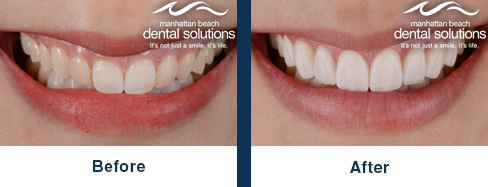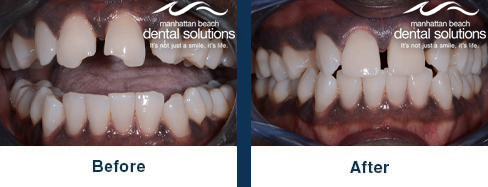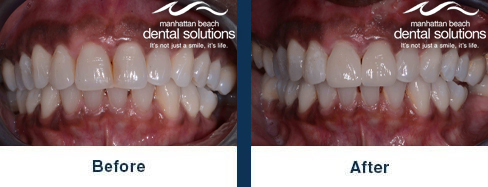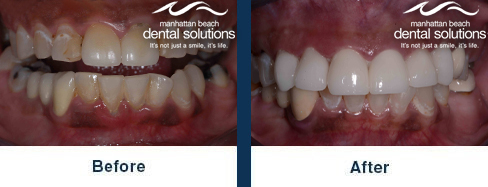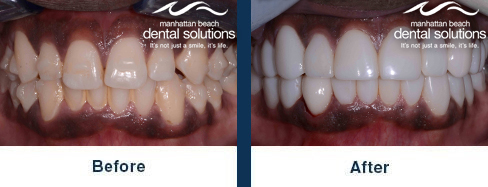Stop living with pain and get effective treatment for TMJ disorder in Manhattan Beach, CA
Temporomandibular disorder, also known as TMJ disorder or TMD, is a painful condition that affects the joint that opens and closes your jaw. It has a variety of symptoms that can vary from patient to patient, frequently making it difficult for patients to obtain the correct diagnosis and treatment. Dr. Don Mungcal in Manhattan Beach, CA is experienced in recognizing the signs of TMJ disorder and can diagnose and provide treatment for the condition so you can stop the pain and discomfort and regain your quality of life.
Causes of TMJ/TMD
TMJ/TMD is a relatively common disorder that is estimated to affect over 10 million Americans. It can be caused by one or more issues, including problems with the joint’s cartilage, erosion of the disk located in the joint, traumatic injury to the joint, grinding or clenching your teeth, or simply being stressed, which makes your muscles tighter and increases tooth clenching. Your risk of TMJ disorder may be higher if you have arthritis or a connective tissue disease, both of which can affect the health of the temporomandibular joint. In some cases, it can be difficult to determine why someone has TMJ.
Symptoms that you have TMJ
There are a variety of symptoms associated with TMJ/TMD, but the most common one is pain and discomfort in the jaw or face. Other symptoms you may have TMJ disorder include:
- A clicking or popping sound when you open and close your jaw or when you chew
- Your jaw gets stuck in an open or closed position
- Discomfort when you are chewing
- Trouble opening your mouth wide
- Swelling near your jaw or on one side of your face
- The sensation that your upper and lower jaws don’t fit together correctly
- Other chronic symptoms such as frequent headaches, tooth pain, neck pain, earaches, or ringing in the ears
The first step in determining if you have TMJ disorder is getting a consultation by a qualified dentist. Dr. Don Mungcal conducts a comprehensive evaluation to determine if you have the disorder. He will physically examine your jaw to see how it opens and closes, its range of motion, and which parts of it are painful. You may also need X-rays or other imaging tests to determine if there are underlying structural issues causing your pain.
It is never to let to improve gum health. Please call
310-340-6663to schedule an appointment at Manhattan Beach Dental Solutions.
Treatment options for TMJ
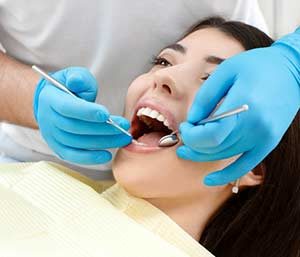
If you have TMJ/TMD, Dr. Mungcal will suggest the treatment plan that is best suited for your individual condition and symptoms. Typically, the dentist will suggest the least invasive options first, which can often help resolve your symptoms. These include lifestyle changes such as the following:
- Practice stress management with techniques such as deep breathing, meditation, yoga, and daily exercise
- Stop chewing gum
- Use a hands-free phone or speakerphone when you are on phone calls
- Don’t bite your nails or lean on your chin
Other non-invasive treatment options include over-the-counter or prescription-strength pain relievers, muscle relaxers to relieve the pain from the spasms caused by the disorder, physical therapy to strengthen and stretch the affected muscles, or using a mouthguard at night, which often helps stop your jaw pain and can also prevent tooth grinding.
If these types of treatments do not provide the relief you need, then the following types of procedures may be able to help:
- Corticosteroid injections: In this procedure, corticosteroids are injected into the joint to relieve pain and reduce inflammation.
- Arthrocentesis: This is a minimally invasive procedure in which a small needle is placed in the joint to irrigate fluid into it and remove any inflammatory particles or debris from the joint.
- Arthroscopic surgery: In this procedure, a thin tube called a cannula is inserted into the space in the joint and then the joint is surgically repaired. This is a less invasive option than open joint surgery and has fewer risks and complications.
- Mandible surgery: In a procedure called a modified condylotomy, surgery is performed on your jawbone rather than the joint to help reduce pain and locking of your jaw.
- Open joint surgery: In this surgical procedure, your joint is repaired or replaced with open surgery. This is typically reserved for when other less invasive treatments do not work or if there is a structural issue with your joint.
Dr. Mungcal is experienced in diagnosing and treating patients with TMJ disorders using methods that work the best for their individual needs and preferences. Call the team at Manhattan Beach Dental Solutions today at 310-340-6663 to schedule your consultation!
Share this Article
Back to Tmj Tmd Page


